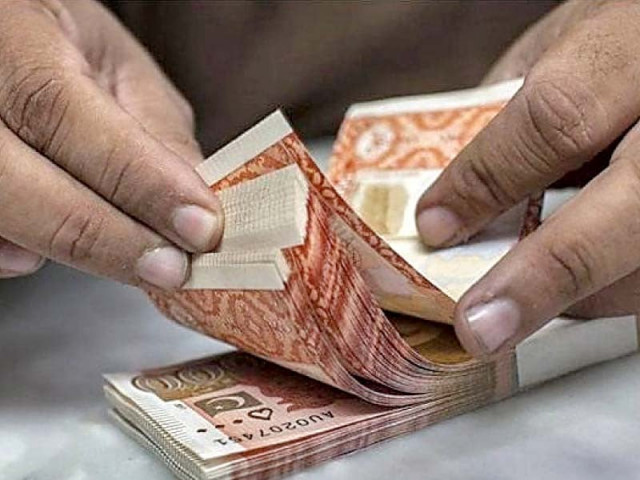Economic chokehold and current account balance
Slowdown in exports, imports signals ominous challenges ahead for policymakers

Pakistan is facing numerous economic challenges, which are exacerbated by the political impasse.
Economic activity is adversely impacted as Pakistan struggles to make external debt repayments. Current account balance was in surplus in recent months as dollar outflows in the form of import payments have drastically reduced.
Inflows have outweighed outflows, which is a rarity given the import and export patterns of Pakistan.
The country primarily relies on imports of fuel and industrial raw materials, the demand for which is driven by the level of economic activity. Lack of domestic demand, imposition of administrative controls and reduction in industrial activity have reduced imports, leading to lower amounts of dollar outflows.
Pakistan relies on IMF financing to meet its external debt obligations. Lack of financing from the IMF throws a spanner in the works, dashing hopes of economic relief. This uncertainty in the economic environment is likely to persist with the delay in IMF financing and continued uncertainty in the political sphere.
According to data provided by the Pakistan Bureau of Statistics, imports were less than $3 billion in April 2023, which was less than half the value reported in April 2022 and 22.6% less than the value reported in March 2023. Exports too decreased in April 2023, falling from $2.4 billion in March 2023 to $2.1 billion in April 2023. They were $2.9 billion in April 2022. Trade deficit in the first 10 months of current fiscal year decreased to $23.7 billion from $39.3 billion in the same period of previous year.
According to data shared by the State Bank of Pakistan (SBP) on growth of import payments and export receipts, the former has negative values year-on-year since September 2022 while the latter has negative values year-on-year since November 2022.
It is important to note that import payments had shown year-on-year growth for every month from December 2020 till August 2022.
Stop-gap measures introduced earlier in the fiscal year to alleviate balance of payments concerns have negatively impacted economic activities. Slowdown in both exports and imports signals ominous challenges ahead for economic policymakers.
Imports in the first nine months of FY23 were valued at $43.9 billion, a decrease of 25.4% from $58.9 billion reported in the same period of previous fiscal year. Imports of machinery group decreased by almost 50%, with significant declines across all products. Imports of textile machinery decreased by 54%, imports of mobile phones decreased by 71% and imports of office machinery decreased by 46%.
Imports of transport group fell by more than 50% in the first nine months of FY23. Imports of CBUs declined by more than 70%, while imports of CKD/SKD decreased by 48%.
Imports of petroleum group, which had almost touched $15 billion in the first nine months of FY22, went down by 11.7% in the same period in FY23. Furthermore, imports of textile group dropped by 14% in the current fiscal year.
However, interestingly imports of raw cotton increased by 16% this fiscal year, which could be due to fall in cotton production in flood-stricken areas, increasing the demand for imported cotton.
Imports of synthetic fibre decreased by 36%, which suggests that production of textile products is likely to be adversely impacted.
Unfortunately, exports also declined in the first nine months of FY23. Total exports decreased from $23.4 billion in July-March FY22 to $21.1 billion in July-March FY23, which is a 10% decline. Textile group has been the most adversely impacted with exports decreasing from $14.2 billion to $12.5 billion. Major textile products such as bedwear, knitwear, towels and readymade garments have registered a decline.
The only product to have reported an increase is tents, canvas and tarpaulin, as they were likely shipped to the earthquake-hit regions.
In essence, both exports and imports have been on a declining trend with the decrease in imports outpacing the decrease in exports. This results in a lower trade deficit, leading to a current account surplus once remittances are considered. Remittances, as reported by the SBP, also decreased from $23 billion in the first nine months of FY22 to $20.5 billion in the same time period in FY23.
Remittances from the UAE and Saudi Arabia have taken a larger hit, declining by more than 15.7% in FY23. Interestingly, remittances from the US have displayed a slight uptick of 3.2%. In essence, the swing in the current account deficit has been mainly due to the restrictions on imports.
The Business Confidence Index, published monthly by the SBP in collaboration with the Institute of Business Administration, Karachi, has been on a downward spiral since October 2022, as it decreased from 46.3 points to 37.5 points in March 2023.
The current business confidence is at 35, while the expected business confidence in the next six months is at 40. The last figure is disconcerting as the business community has low expectations of a recovery, implying that the challenges will continue to persist.
The writer is the Assistant Professor of Economics and Research Fellow at CBER, Institute of Business Administration, Karachi
Published in The Express Tribune, May 15th, 2023.
Like Business on Facebook, follow @TribuneBiz on Twitter to stay informed and join in the conversation.


















COMMENTS
Comments are moderated and generally will be posted if they are on-topic and not abusive.
For more information, please see our Comments FAQ